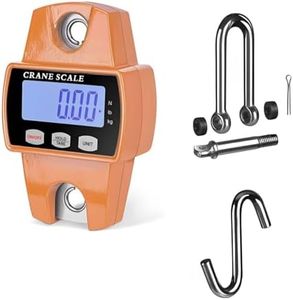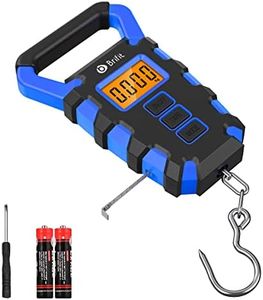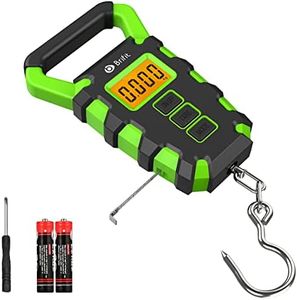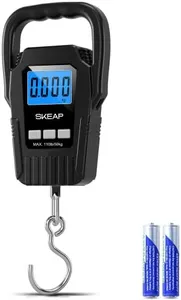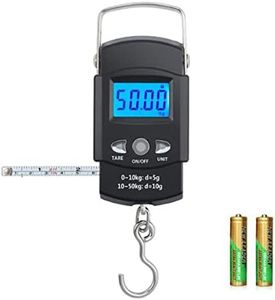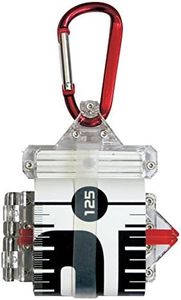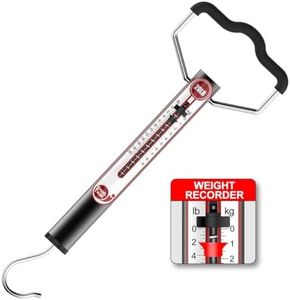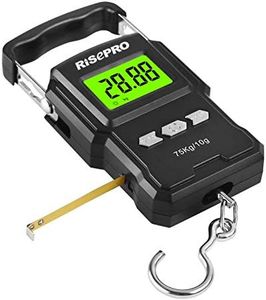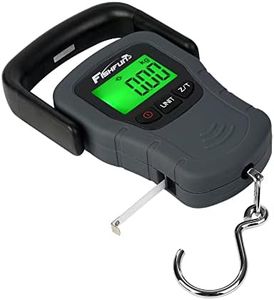We Use CookiesWe use cookies to enhance the security, performance,
functionality and for analytical and promotional activities. By continuing to browse this site you
are agreeing to our privacy policy
10 Best Digital Fish Scales
From leading brands and best sellers available on the web.By clicking on a link to a third party's website, log data is shared with that third party.
Buying Guide for the Best Digital Fish Scales
Choosing the right digital fish scale can make fishing trips easier and more enjoyable by providing accurate weight measurements of your catches. It's important to consider your frequency of use, the size and type of fish you typically catch, and where you usually fish. By understanding the key features and specifications, you can select a scale that meets your needs and helps you keep track of your catches with confidence.Weight CapacityWeight capacity refers to the maximum weight a digital fish scale can measure, and it's a crucial factor because you want to ensure it can handle the largest fish you expect to catch. Fish scales typically range from lower capacities like 10-20 pounds for small fishing or casual use, to mid-range capacities around 50 pounds which are suitable for most recreational anglers, up to 110 pounds or more for larger game fish. To pick the right one, think about the biggest fish you are likely to encounter and choose a scale that can comfortably handle a bit more than that to avoid overloading or damaging the scale.
AccuracyAccuracy tells you how closely the scale will display the actual weight, usually specified in increments like 0.01 lb, 0.1 lb, or 0.2 lb. The more precise the increment, the more detailed your weight reading. Higher accuracy is important if you need precise records for competitions or personal tracking, while those fishing casually may be fine with less sensitive increments. Think about your needs: if you care about very small differences, opt for a scale with fine accuracy; for general use, standard increments should suffice.
Display Type and ReadabilityThe display type refers to how the weight is shown, commonly via LCD or backlit screens. Readability matters because you'll often be outdoors in bright sunlight or possibly at dawn or dusk, where glare and low light can make it hard to see the numbers. If you fish in varying light conditions, look for scales with a large, backlit display for easy reading; if you fish mostly during the day in bright sun, consider anti-glare screens for better visibility.
Power Source and Battery LifeDigital fish scales are typically powered by batteries, and good battery life ensures your scale works through long trips without dying unexpectedly. Some use standard batteries you swap, while others might have rechargeable options. If you fish long hours or forget to replace batteries, longer battery life or low-battery indicators become more important. Think about how often you fish and your charging habits—if you don't want frequent battery swaps or charging, aim for scales that are known for long-lasting power.
Water ResistanceWater resistance is important to protect your digital scale from splashes and rain, common around water. Scales range from those with basic resistance (splash-proof) to more robust water-resistant models. If you fish from a boat or in rainy environments, prioritize a scale with higher water resistance so it can withstand being exposed to water without getting damaged.
Attachment Mechanism (Hook or Gripper)The attachment mechanism is how you hang or hold the fish to get its weight, either via a metal hook or a fish-friendly gripper. Hooks are straightforward but may not be suitable for all fish types or can cause harm to smaller fish. Grippers can be easier and safer, especially for catch-and-release or for handling large, strong fish. Think about the fish you catch and your preference for fish care—if you regularly release fish, a gripper might be better; otherwise, a sturdy hook could be enough.
Additional Features (Tape Measure, Memory, Units)Some digital fish scales come with extra features like built-in tape measures for length, memory storage for multiple catches, or the ability to show weight in different units (lb, kg, oz). These can be very handy for detailed record-keeping or if you participate in competitions. Choose scales with the features you'll actually use: if you want to track every catch, look for memory storage; if you enter contests with length requirements, a built-in tape measure will save you from carrying extra gear.
